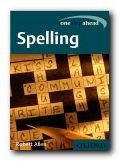beginner’s simple guide to spelling and language
Spelling worries many people. Understandably so, because mistakes in spelling are often regarded as a black mark in terms of literacy and written competence. Oxford University Press have just brought out a series of short beginners’ guides on communication skills. The emphasis is on compact, no-nonsense advice directly related to issues of everyday life. In his Spelling Guide Robert Allen takes a reassuring line in explaining why spelling is difficult in English, and he offers a variety of solutions to the problem.
 Beginners in particular will find his approach very helpful, and even advanced users will probably learn a thing or two. He starts by showing you how to use dictionaries, then how to use spell-checkers. He explains how and why English spellings have often become so irregular. And fortunately, he also explains the cases where some rules do apply.
Beginners in particular will find his approach very helpful, and even advanced users will probably learn a thing or two. He starts by showing you how to use dictionaries, then how to use spell-checkers. He explains how and why English spellings have often become so irregular. And fortunately, he also explains the cases where some rules do apply.
Some of his advice tips over into tutorials on the nature of language – quite rightly. For instance, one good tip for many people is that the apostrophe in terms such as who’s and it’s stands for a missing letter. Knowing this might help you to understand the spelling, and help you put the apostrophe in the right place.
He deals with all the most common problems – not only the most notorious misplaced apostrophe, but the s/z issue in words such as realise/realize, and word endings, especially the doubling of consonants in words such as regret/regretted. (Yet it’s target/targeted – how strange!)
There’s a whole chapter explaining why spelling is such a complex issue. Basically, it’s because English is comprised of so many different languages. The influence of Latin, Greek, Anglo-Saxon, French, and German are all still actively present.
The second half of the book is a series of checklists of ‘problem’ words – short (weird) long (accommodation) confusables accept/except) noun and verb forms (advice/advise) how to choose the right ending (stationary/stationery) verb endings (finalize/surprise) irregular plurals (banjos/zeros) and words with Latin and Greek endings (addendum/vortex).
The chapters of this book are short, but almost every page is rich in hints and tips. The strength of this approach is that it avoids the encyclopedic volume of advice which in some manuals can be quite frightening. This is a book which will reassure those who need it.
© Roy Johnson 2003
Robert Allen, Spelling, Oxford: Oxford University Press, 2002, pp.128, ISBN: 0198603835
More on writing skills
More on language
More on grammar